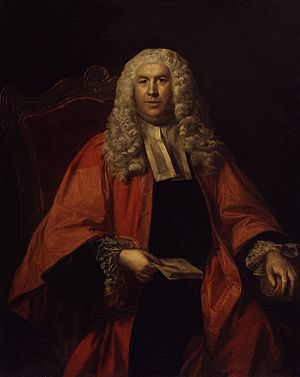Rights of Englishmen facts for kids
The Rights of Englishmen were a set of important rights that people in England believed they had. These ideas began with a famous document called the Magna Carta.
Later, when English people settled in places like North America, they felt they should have even more rights and freedoms. They believed these rights were theirs, beyond what the English King or Queen had already given them.
One very important idea was "no taxation without representation". This meant that colonists in America felt it was unfair to be taxed by the British Parliament if they didn't have their own representatives there. They believed that new laws like the Sugar Act and the Stamp Act were unfair. They felt these laws went against their rights as Englishmen, as stated in the Bill of Rights 1689. This disagreement helped lead to the American Revolution. The idea of these rights is also found in the Declaration of Independence, which talks about "certain unalienable rights." Eventually, these colonists stopped thinking of themselves as Englishmen and became Americans.
Contents
What Were the Rights of Englishmen?
The Rights of Englishmen were not written down in one single document. Instead, they were a collection of traditions, laws, and ideas that had developed over many centuries in England. They were seen as basic freedoms that all English people should have.
Roots in the Magna Carta
The Magna Carta was signed in 1215. It was a very early document that limited the power of the King. It said that even the King had to follow the law. It also gave some rights to free men, like the right to a fair trial. This was a big step towards protecting people's freedoms.
Common Law and Parliament
Over time, English common law also helped shape these rights. Common law is based on court decisions and traditions, not just written laws. The British Parliament also grew in power. It began to pass laws that further defined and protected the rights of English citizens.
Rights in the Colonies
When English people moved to North America to start colonies, they expected to keep all their rights as Englishmen. They saw themselves as full English citizens, even though they lived far away.
The Idea of Representation
The colonists believed that if the British Parliament made laws that affected them, they should have a say in those laws. This is the idea of representation. They felt that only their own local colonial assemblies, where they had elected representatives, should tax them.
No Taxation Without Representation
This became a major complaint. The British Parliament started passing new taxes, like the Stamp Act, to help pay for wars. The colonists argued that since they did not elect members to the British Parliament, Parliament had no right to tax them. They saw this as a denial of their basic rights as Englishmen.
Leading to the American Revolution
The disagreement over the Rights of Englishmen, especially "no taxation without representation," grew stronger. The colonists felt their rights were being ignored.
Protests and Conflict
Colonists organized protests and boycotts against the new taxes. They believed the British government was treating them unfairly. This led to more tension and eventually to fighting.
Becoming Americans
As the conflict grew, many colonists began to think differently. They realized that the British government might not respect their rights. This led them to seek complete independence. The Declaration of Independence listed many of these grievances. It stated that all people have "unalienable rights," like the right to life, liberty, and the pursuit of happiness. This marked a shift from thinking of themselves as Englishmen to becoming Americans.
See also
In Spanish: Derechos de los ingleses para niños
 | Claudette Colvin |
 | Myrlie Evers-Williams |
 | Alberta Odell Jones |


